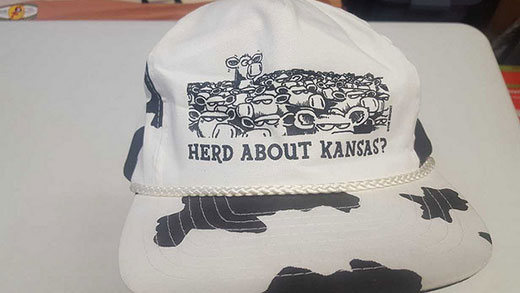The Kansas Rural Economic Development Alliance helps to support the recruitment of diaries to western Kansas. | Download this photo
Kansas Profile – Now That’s Rural: Western Kansas Rural Economic Development Alliance
November 21, 2018
“Herd about Kansas?” I saw that phrase – with “heard” spelled “herd” as in a herd of cows – on a cap which displayed a picture of a cowherd. The cap was colored in black and white splotches like a Holstein milk cow. That cap is the type of eye-catching item which might have been used in the early 1990s to recruit dairies to western Kansas. This jointly-supported recruitment effort has not only sparked remarkable economic growth, it has been part of the spirit of regional cooperation.
In previous weeks, we’ve learned about leading dairymen in three different regions of the state. The dairy industry has grown significantly in this state, particularly in western Kansas.
In the early 1990s, community leaders in western Kansas recognized that there were opportunities to grow and attract the dairy industry. The Western Kansas Dairy Coalition was formed.
Joann Knight of Ford County Economic Development was involved at the beginning. “Dairies were getting squeezed out of California,” she said. The bountiful feed production and wide open spaces of western Kansas made this seem like a perfect location to relocate. Community leaders came together to jointly recruit to the region. By pooling their efforts, these communities could send one big, effective display to a trade show, for example, rather than having multiple communities send several small, ineffective ones.
Note that I just said that milk production was being `squeezed out’ of California and that the recruitment efforts should be `pooled.’ Isn’t that udderly funny? Okay, enough milk jokes.
Apart from the dairy industry, visionary leaders in western Kansas were concerned about the future of their communities and the region in general. Among those who saw the need to work together for mutual benefit were the late Steve Miller from Sunflower Electric Power Corporation; Carol Meyer, who was at the Chamber of Commerce in Garden City at the time; and Lyle Butler, then-president of the Dodge City Chamber of Commerce.
In May 1994, some 85 people attended a meeting to discuss the economic challenges of the region and to consider how a regional organization might help. They agreed to help plan a regional organization. This resulted in the western Kansas Rural Economic Development Alliance or wKREDA. wKREDA provided a unifying force for all of western Kansas.
Eventually, the dairy coalition came under the organizational umbrella of wKREDA, which helped organize the recruitment efforts.
For example, a wKREDA delegation went to the big dairy expo in Tulare, California and the New York farm show. This raised the visibility of western Kansas as a potential site for dairies to relocate.
Carol Meyer remembers being part of the dairy recruitment team. “Every week we went somewhere and met with dairy managers to learn about what they needed,” Carol said. Bankers and rural electric cooperatives agreed to put up funds to help the new dairies.
The effort worked. In 1994, the first dairies from California began to move to Kansas. At the New York farm show, wKREDA representatives met the McCarty family which would eventually relocate their dairy farm to Kansas also.
This was genuine rural economic development. The new dairies stimulated jobs, construction, growth in school enrollment, and other economic activity. The McCartys’ first Kansas dairy was located near the rural community of Rexford, population 232 people. Now, that’s rural.
Today wKREDA continues to work on dairy growth along with other issues benefitting western Kansas. For example, wKREDA provides economic and community development education for its members, builds relationships with various agencies and partners, and provides political representation to policymakers in Topeka and Washington. wKREDA represents 55 counties which have chosen to pool their resources for mutual benefit. Christy Hopkins, Greeley County economic development director, is the current president of wKREDA.
For more information, go to www.discoverwesternkansas.com.
Have you Herd about Kansas? We commend Carol Meyer, Christy Hopkins, and all those previously and currently involved with wKREDA for making a difference with dairy recruitment and regional cooperation. Working together, they were able to make themselves heard.
And there’s more. Growth in dairy production has led to value-added opportunities in dairy and other industries. We’ll learn about that next week.
Audio and text files of Kansas Profiles are available at http://www.kansasprofile.com. For more information about the Huck Boyd Institute, interested persons can visit http://www.huckboydinstitute.org.
----------------
The mission of the Huck Boyd National Institute for Rural Development is to enhance rural development by helping rural people help themselves. The Kansas Profile radio series and columns are produced with assistance from the K-State Research and Extension Department of Communications News Media Services unit. A photo of Ron Wilson is available at http://www.ksre.ksu.edu/news/sty/RonWilson.htm.


